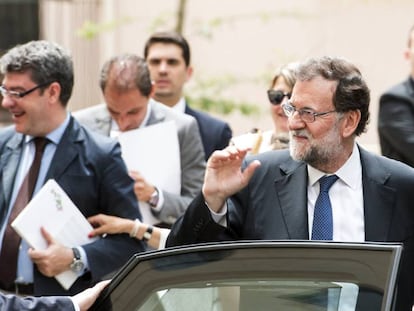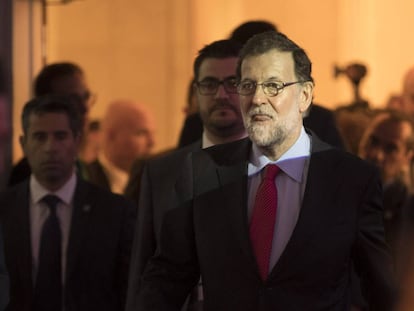In court, Spanish PM denies knowledge of alleged slush fund at ruling PP party
Rajoy took witness stand in unprecedented court appearance over political corruption
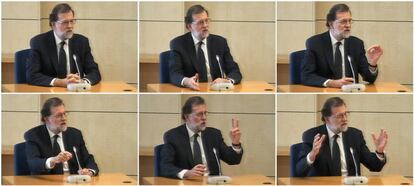
During a historic court appearance on on Wednesday morning, Spanish Prime Minister Mariano Rajoy said that he had “absolutely no knowledge” about the possible existence of parallel accounts within his Popular Party (PP) that were allegedly used for opaque donations and illegal party financing. “I was never in charge of anything to do with accounting,” he said.
The 62-year-old conservative party leader testified as a witness in the long-running trial over the Gürtel case, a vast corruption scheme that has plagued the PP since 2009. The scope of legal proceedings into the scheme is so large that the investigation has been broken up into sections.
At a highly anticipated appearance that began shortly after 10am and was interrupted at one stage for five minutes because of technical problems, Rajoy answered questions about the alleged existence of a secret accounting system (the so-called caja b) at the PP – details of which first emerged in 2013.
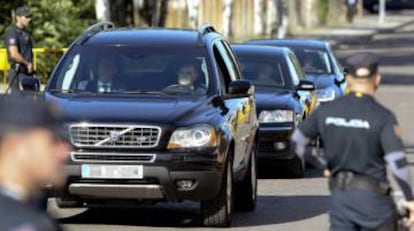
He told the court that he was “never” aware of any cash donations by business people to fund campaigns. “I have never dealt with economic issues in the party,” he stated
Rajoy said that the bonuses for senior officials that show up in the parallel accounts that were kept by former party treasurer Luis Bárcenas are “absolutely false.” “We earned a salary as deputies and quite a few people made a bonus that was paid by the party and which showed up on their tax returns,” he said. Bárcenas has stated in the past that he personally kept secret party ledgers reflecting illegal donations and tax-free cash payments to many party officials, including Prime Minister Mariano Rajoy.
Asked about Francisco Correa, a businessman who is considered the mastermind behind the Gürtel bribes-for-contracts network, Rajoy said that “he was a party supplier. And suppliers receive money in exchange for their services. That is simply common sense.”
Ya somos más de 100 en #ilegalizarPP diciéndolo a Mariano q su partido es una Mafia pic.twitter.com/fY9ttDBH2R
— Coordinadora 25S (@Coordinadora25S) July 26, 2017
“We are already more than 100 telling Mariano that his party is a Mafia”
In February, Correa and two top aides were found guilty in connection with a section of the Gürtel case known as Fitur that involved embezzlement, influence peddling, bribery of public officials and conspiracy in the Valencia region. They were sentenced to prison terms of 13 years each.
Protests
Outside the courthouse in San Fernando de Henares (Madrid), a group of protesters had gathered on Wednesday morning with posters calling the PP a “mafia” and Rajoy “a criminal.”
Inside the courtroom, Rajoy sat down at a desk positioned between the bench and the lawyers’ seating area. After swearing to tell the truth, he stated that “I know some of the accused, and I have no special relationship with them.”
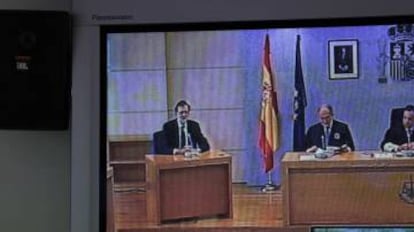
Mariano Benítez de Lugo, the attorney representing Adade – a progressive legal association representing the private prosecution in the case – complained that the PM was given a seat usually reserved for judges, prosecutors, lawyers and the clerk of the court.
This part of the Gürtel trial is examining the 1999-2005 period, during which companies controlled by Francisco Correa spent €245,492 on local PP campaigns in the outlying Madrid towns of Pozuelo de Alarcón and Majadahonda in 2003.
Asked about his role as secretary general of the PP, Rajoy said that he did not carry out any activities at party headquarters except for a six weeks spent organizing the elections. But Rajoy said that he knew nothing about the financial aspects of the campaigns, and that his role was political, as the campaign director between 1994 and 2000.
There is “a clear separation” between the political and economic aspects of a campaign, he said.
Los periodistas recargan fuerzas. Rajoy lleva declarando más de una hora y algunos hacían fila desde las 7 https://t.co/nFZ7okvxOk pic.twitter.com/LBoaHIhKB6
— Virginia Martínez (@virmarcres) July 26, 2017
“Journalists gathering their strength. Rajoy had been testifying for over 90 minutes at this point, and some reporters had been standing in line since 7am.”
Rajoy’s appearance ended at noon.
It was the first time that a sitting head of government has been forced to take the witness stand since Spain returned to democracy in the late 1970s. Rajoy’s appearance attracted international media attention and forced authorities to roll out extensive security measures outside the High Court, which is overseeing the case, one of the most high-profile in recent Spanish history.
Rajoy is the first sitting democratic head of government to testify as a witness, but he is not the first to appear in court. Adolfo Suárez was forced to answer questions regarding the Banesto bank scandal in 1995, and Felipe González – Spain’s longest-serving PM – was in court in 1998 over the GAL group, a state-sponsored death squad created to fight ETA. Neither one was in office at the time of their court appearance, however.
English version by Susana Urra.
